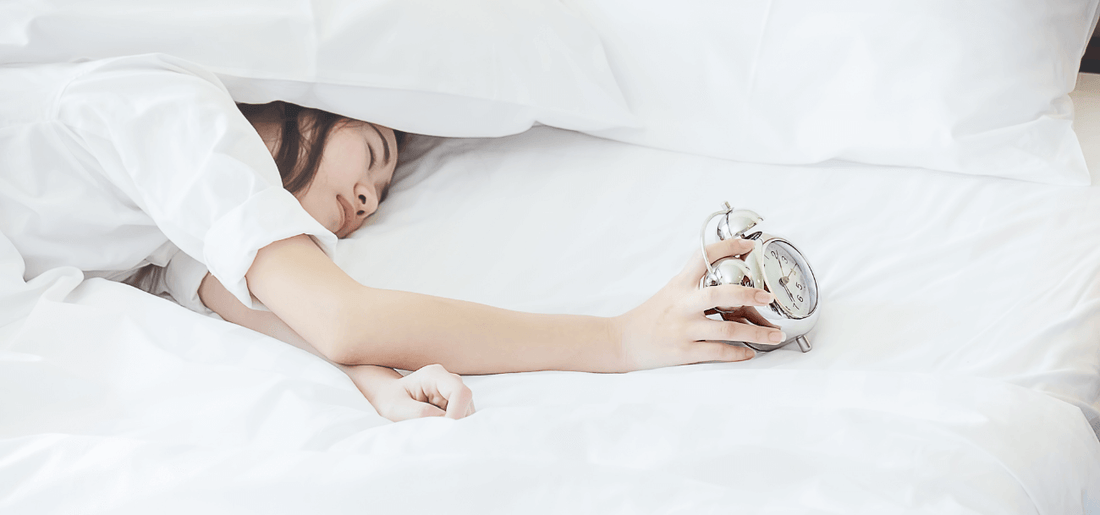Why can’t I wake up to my alarms?

There are hundreds of online forums and threads dedicated to answering the question, “why can’t I wake up to my alarms?” Comments often range from well-meaning but misguided to openly disparaging. And while on the surface it may seem to be a fairly mundane problem, it can have severe consequences on your personal or professional life, or even be an indicator of an underlying health condition.
To help, we examine some of the most common reasons why you sleep through your alarms, and what you can do to approach and overcome this problem. Read on to learn more.
Why does it happen?
There are several possible reasons why it happens, each of which are explored below. In some cases, these causes are interlinked.
You’re not getting enough sleep
Some may consider this to be a dull or obvious answer, but the reality is that sleep is essential to health1 and critical for waking cognition or the ability to think clearly and be alert.2
The National Sleep Foundation recommends teenagers get between 8 and 10 hours, and adults get between 7 and 9 hours of quality sleep.3 Sleep disruptions, which could be anything that impacts the continuity of your sleep, can result in you accruing a sleep debt as well as experiencing a number of adverse short-term and long-term health consequences (such as cognitive deficits, moodiness, stress, hypertension, cardiovascular disease to name a few).4
If you’re wondering what sleep debt is, it’s a deficit between the number of hours of sleep you need and the number of hours of sleep you’re getting.5 Naturally, this is a major problem for shift workers who work erratic hours and don’t necessarily have a regular circadian rhythm and sleep cycle, resulting in a decline in cognitive performance and sleepiness during their shifts.6
A study investigating the impact of sleep deprivation on cognitive performance found it caused a greater degree of driving impairment than alcohol intoxication.7 Little wonder then that if you don’t get enough sleep, you might not be able to hit the snooze button, let alone be aware of the alarm clock ringing.
Considering reduced sleep is linked to 7 of the 15 leading causes of death in the US8, and roughly a third of Americans report not getting enough sleep9, it’s clear this is a common problem that needs attention.
Your chronotype
A chronotype is a person’s natural inclination towards an early or late sleep/wake cycle.10 For example, some people are “morning larks” who prefer to sleep early and rise early, while others are “night owls” who prefer to sleep late and rise late.11
If you’re the latter, you might have already sensed the problem here – which is that rising late is not an option for most people, as they may have personal or professional commitments to keep in the morning. Further complicating matters is that shift workers don’t even have a choice between the two, as they work erratic hours.
For those who do have the option, it might help to determine when is the best time to wake up for productivity and to then structure their day around that time. And the good news for night owls is that retraining or resetting your sleep-wake cycle to become a morning person can yield positive results on mental health and performance.12
Sleep disorders
There are a number of sleep disorders that can impact sleep continuity and sleep quality, examples of which include insomnia13, sleep apnoea14, and narcolepsy15.
Particularly relevant to what has been discussed in this post are circadian rhythm sleep disorders (CRSDs), that are a class of sleep disorders where you experience a mismatch between when you want to sleep and when you can fall and remain asleep.16 One of the most commonly encountered CRSD is delayed sleep-phase disorder or DSPD.17 It’s characterised by an inability to fall asleep before 2 am – attempts are usually unsuccessful, involving a lot of tossing and turning – and can result in symptoms of insomnia, excessive daytime sleepiness, and difficulty waking up.18
If you’re curious to learn more about DSPD, then read this first-hand account of someone living with the disorder.
Your health
This is linked to some points raised above, but your health can impact the quality and consistency of your sleep, which in turn can lead to you sleeping right through your alarms.
Stress19 and depression have been linked to excessive daytime sleepiness, and so too have medical conditions like head trauma, strokes, and cancer.20 Taking certain medicines, consuming alcohol, and taking recreational drugs, can also impact your sleep and result in you oversleeping your alarm clock.21
What can you do about it?
The best way to treat a sleep problem is by first understanding the underlying cause. If you’re concerned that you might be suffering from a sleep disorder, or are experiencing health-related issues that are affecting your well-being and sleep, then we suggest discussing the matter with your GP or a mental health professional.
The tips we provide below are for those seeking to improve their sleep and retrain their sleep/wake cycle, so they can wake up in the morning with ease.
Establish a sleep schedule
Studies have found that participants with irregular bedtime schedules tend to experience poor sleep quality.22 If you are sleeping through your alarm, then it may well be worth looking at how much sleep you are getting and when you are going to sleep. Try to follow a realistic sleep schedule – one with sleep and wake times that are practical for you and allow for between 7 and 9 hours of sleep. That being said, make gradual not drastic changes to your desired sleep/wake times, to allow for the body to become accustomed to the new schedule.
It can also help to have something to look forward to after you wake up to help you better establish and follow a routine. So, for example, it can be useful to know how to motivate yourself to work out in the morning, as it also comes with the benefits of physical exercise and starting your day off positively.
Don’t hit the snooze button
Yes, it can be tempting to hit snooze (assuming you hear it) to try to catch an extra ten to fifteen minutes of sleep. However, interrupted sleep caused by repeatedly hitting snooze can actually adversely impact your mood and cognition.23 If you find it difficult waking up with only one alarm, then experiment with different types of alarm clocks. You don’t have to stick to your phone alarm. For example, there are those that don’t wake you up with sound, but rather with light.
Spend time outdoors or in sunlight
It’s easy to take this for granted, especially if you work from home, but exposure to sunlight can influence your circadian rhythm. Our circadian clock is usually most sensitive to light in the hour after we wake up, and spending time outside in the sun – say perhaps going for a run or exercising – can help influence your body’s sleep time and wake time.24 If you happen to live in a country where there is little sunlight throughout the year, then consider investing in a seasonal affective disorder or SAD lamp – it mimics sunlight and can positively impact your body in terms of circadian rhythms and serotonin reuptake.25
Avoid daytime naps
If you are sleepy during the day, it might seem sensible to have an afternoon nap to recover. However, late afternoon naps and long naps can both make it harder to fall asleep at night26 (this, of course, can result in a vicious cycle as you struggle to sleep, oversleep your alarm clock, feel drowsy in the day, and nap again in the afternoon).
Avoid large meals before bed
Studies show that eating within 3 hours of bedtime increases the odds of disrupted sleep and poor sleep quality.27 Bearing this in mind, try to make sure you have dinner well before you plan to sleep.
Focus on good sleep hygiene and a good sleep environment
The above tips we’ve suggested are all examples of good sleep hygiene. They have been scientifically proven to be linked to sleep quality. If you’re interested in learning more about good sleep hygiene, good sleep habits, and what makes a good sleep environment, then do read our comprehensive post on how to sleep well.
If, despite these tips, you find yourself waking up feeling tired in the mornings – as in you are experiencing sleep inertia or grogginess so severe that getting out of bed is very difficult – or if you are a shift worker struggling to focus at work, then you may want to try B・SYNC ON. It’s a clinically proven wake-up supplement with delayed-release technology. Essentially, it releases its all-natural ingredients 7 hours after being consumed, to help you wake up feeling alert and ready to take on the day.
Sources
- https://jcsm.aasm.org/doi/10.5664/jcsm.9476
- https://www.ncbi.nlm.nih.gov/pmc/articles/PMC6281147/
- https://pubmed.ncbi.nlm.nih.gov/29073412/
- https://www.ncbi.nlm.nih.gov/pmc/articles/PMC5449130/
- https://www.ncbi.nlm.nih.gov/pmc/articles/PMC6122651/
- https://www.ncbi.nlm.nih.gov/pmc/articles/PMC4834749
- https://bmcpublichealth.biomedcentral.com/track/pdf/10.1186/s12889-020-09095-5.pdf
- https://www.ncbi.nlm.nih.gov/pmc/articles/PMC6473877/
- https://www.cdc.gov/sleep/data_statistics.html
- https://www.ncbi.nlm.nih.gov/pmc/articles/PMC8063933/
- https://www.ncbi.nlm.nih.gov/pmc/articles/PMC28744/
- https://www.sciencedirect.com/science/article/abs/pii/S1389945719301388
- https://www.nhs.uk/conditions/insomnia/
- https://www.nhs.uk/conditions/sleep-apnoea/
- https://www.nhs.uk/conditions/narcolepsy/
- https://www.ncbi.nlm.nih.gov/pmc/articles/PMC4212693/
- https://www.ncbi.nlm.nih.gov/pmc/articles/PMC5803043/
- https://www.sciencedirect.com/topics/neuroscience/delayed-sleep-phase-disorder
- https://www.nhs.uk/mental-health/feelings-symptoms-behaviours/feelings-and-symptoms/stress/
- https://www.ncbi.nlm.nih.gov/pmc/articles/PMC3066783/
- https://www.nhs.uk/conditions/excessive-daytime-sleepiness-hypersomnia/
- https://www.ncbi.nlm.nih.gov/pmc/articles/PMC2718885/
- https://www.ncbi.nlm.nih.gov/pmc/articles/PMC6689426/
- https://www.cdc.gov/niosh/emres/longhourstraining/light.html
- https://www.ncbi.nlm.nih.gov/pmc/articles/PMC6746555/
- https://www.nhlbi.nih.gov/files/docs/public/sleep/healthysleepfs.pdf
- https://www.ncbi.nlm.nih.gov/pmc/articles/PMC7215804/







